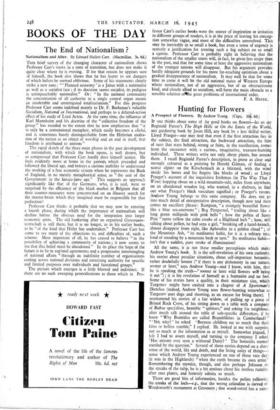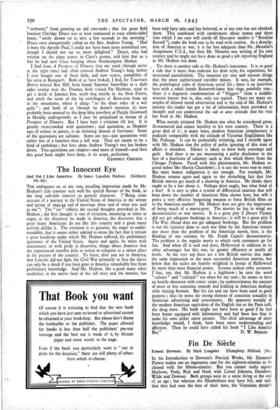Hunting for Flowers
IF one thinks about some of he good books on flowerti' let us say Reginald Farrer's The High Hills or On the Eaves of the World, any gardening book by Jason Hill, any book by a less-skilful writer, Lloyd Praeger—one may find that even if the first attraction lies in the subject, the final attraction, the backward attraction, the hint of tune that stays behind, Strong or faint, in the recollection, comes from the encounter with, a curious, imaginative, treasure-hunting individual. These writers write not only about plants, but around them. I recall Reginald Farrer's description, in prose as clear and strongly coloured as a painting by Harold Gilman, of finding, a scarce alpine on the Kirschenjoch in a blizzard, with the wind inside his bones and his fingers like blocks of wood or Lloyd Praeger's account of the inquisitive Irishman (in The Way That I Went) hopping about on a wild mountain-side, miles from anywhere, on an abandoned wooden leg, who wanted, in a shebeen, to find out what Praeger's black vasculum signified ; or Praeger's ravens. Andrew Young belongs to this same company. He does not go into much detail of interpretative description, though now And then comes an excellent phrase: Rampion, "a strangely beautiful flower like a blue sea-anemone " ; Bog Pimpernel, "trailing about like a long green millipede with pink bells"; how the pollen of Scots Pine "turns yellow the calm creeks of a Highland loch " ; how, still talking about pollen, he had seen a girl, " breaking .off a hazel-branch, almost disappear from sight, like Aphrodite in a golden cloud " ; of the. Mountain Ash, " its meditative habit, for it is a solitary tree, fond of standing by a mountain beck or tarn." Its meditative habit— isn't that a sudden, pure stroke of illumination?
All the same, it ,is not these smaller percep-tions which make Andrew Young's book. It is the self-revelation of his own curiosity, his stories about peculiar situations, about self-important botanists, rather doubtfully honest (" if there is any dishonesty in our nature, sooner or later." says Andrew Young—and I know, with him, that he is speaking the truth—" sooner or later wild flowers wilt bring it out ") ; it is his revelation of himself as a humanist and no fool. Some of his stories have a quality, in their miniature size, which Turgenev might have exalted into a chapter of A Sportsman's Sketches (indeed, Andrew Young uses flower-hunting somewhat as Turgenev uses dbgs and shooting, as an excuse for being there). I recommend his stories of a fair widow, of pulling up a piece of Bristol Rock Cress, of his sitting down to a table with a company of Rubus specialists, bramble " splitters," and asking his neighbour, after much talk around the table of sub-specific differences if he knew "Why Brambles are called Brumblikites in Cumberland? " " ' N6, why?' he asked 'Because children eat so much that their
kites or bellies rumble," I replied. He looked at me with surprise, not so much at the information as at myself. Somewhat piqued, I felt I had to assert myself, and turning to the company I asked, Has anyone ever seen a withered Daisy? "The botanists seemed startled by the question." Several of these stories depend on a sharp sense of the world, life and death, and the living unity of things—a sense which Andrew Young experienced on one of those rare days (it was in the Highlands) "when the earth became its own artist."
Remembering the mystics, though, and also perhaps Johnson on the streaks of the tulip, he is a bit anxious about his restless running after rare plants, and honestly admits so much..
There are good bits of information, besides the pollen yellowing the. creeks of the loch--e.g., that the wrong. ceLandine. is carved. on Wordsworth's monument at Grasmere ; that wood-sorrel has a name " stubwort," from growing on old tree-stubs ; that the great field botanist Claridge Druce was at least rumoured to wear elastic-sided boots, "easily drawn on to save a few seconds in the morning." Druce once unexpectedly called on the Rev. Andrew Young. "Had it been the Apostle Paul, I could not have been more astonished nor, though I should not say so, more delighted." Druce, who had written on thz plant names in Clare's poems, told him that as a boy he had seen Clare hanging about Northampton Market I find from A Prospect of Flowers that my track (though never at the right time) had often crossed Andrew Young's long before I ever bought one of those little, and now scarce, pamphlets of his verse at Bumpus's. Both of us have looked, I find, for Teucnum Botrys behind Box Hill, both found Summer Snowflake in a dark alder swamp near thz. 'Thames, both visited Par Harbour, tried to get a drink at Jamaica Inn, smelt bog myrtle in the New Forest, and smelt the scent of the fat root-fingers of Rose-root from up in the mountains, where it clings "to the sheer sides of a wet gully " ; and both of us (though he doesn't mention it) have probably been amazed by the deep blue jewellery of Purple Gromwell in Mendip undergrowth; so I may be prejudiced in favour of A Prospect of Flowers. But I have kept a criticism till last. It is grossly overcrowded with quotations ; and quotation, as Hopkins says of echoes in poetry, is an irritating disease of literature. Some of the quotations are sultanas. Some are not--just quotations with rather less of a function than a full stop. - They are meant to be a kind of anthology ; but here alone Andrew Young's tact has broken down. Two quotations per chapter—and more of himself—and then this good book might have been, in its scope, perfection. GEOFFREY GFUGSON.



























 Previous page
Previous page